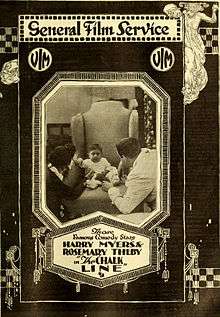General Film Company

The General Film Company was a motion picture distribution company in the United States. Between 1909 and 1920, the company distributed almost 12,000 silent era motion pictures.
The General Film Company was formed by the Motion Picture Patents Company (MPPC) in an attempt to monopolize distribution. In 1909, the General Film Company tried to seize the equipment of independent distribution companies to discourage their activities.[1] Using their control over several film patents, the General Film Company and MPPC tried to force independent distribution companies to sell out or lose their patent licenses.[2]
Competing organizations, such as the Motion Picture Distributing and Sales Company, the National Independent Moving Picture Alliance and the Film Service Association, emerged to challenge the trust.[3] By 1912, the power of the General Film Company had declined and the U.S. Justice Department started prosecution of the MPPC and the General Film Company under the Sherman Act.
On March 30, 1918, the General Film Company was sold, along with the MPPC, to the Lincoln & Parker Film Company of Massachusetts. Thomas Edison reacquired these assets when the Lincoln & Parker Company went bankrupt, and sold them to producer Robert L. Giffen in October 1919.[4]
References
- ↑ The Birth of the Movie and of the Recording Industries page 36, Chapter 2: Creation Under Competition of Against Intellectual Monopoly, Michele Boldrin and David K. Levine, Cambridge University Press, July 7, 2008, ISBN 0-521-87928-0
- ↑ page 12 of The decline and fall of the European film industry: sunk costs, market size, and market structure, 1890–1927, Gerben Bakker, The Economic History Review, Volume 58, Number 2, May 2005 , pp. 310-351(42), Blackwell Publishing
- ↑ The Motion Picture Distributing and Sales Company, Max Joseph Alvarez, Film History: An International Journal, Volume 19, Number 3, 2007, pp. 247-270, Indiana University Press.
- ↑ Chronology: 1879-1931, Thomas A. Edison Papers, Rutgers University